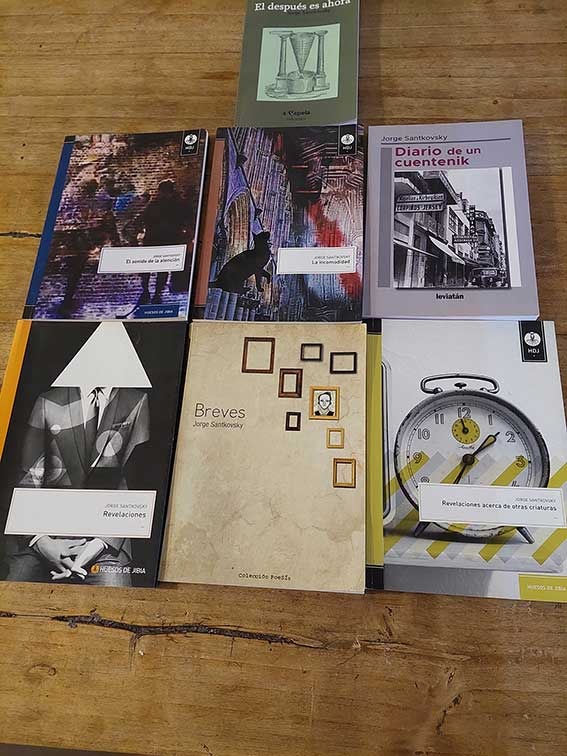La tierra baldía
La inhumacion de los muertos ( extracto)
"Abril, es el mes más cruel,esparce
lilas por la tierra muerta,confunde
memoria y deseo,agita
las negras raíces con lluvias de primavera.
El invierno nos mantuvo al abrigo, cubrió
el suelo con una nieve descuidada, dando
un toque de vida a los brotes resecos"
El sermon del fuego
"Una rata se deslizo sigilosa entre la hojarasca
restregando su gruesa barriga por la orilla
mientras yo pescaba en el oscuro canal
una tarde de invierno detrás del gasómetro
cavilando sobre el naufragio de mi hermano el rey
y sobre la muerte ,antes, de mi padre el rey."
Muerte por agua
Flebas el fenicio, quince lunas que yace en tierra.
olvidó el grito de las gaviotas, y el infinito mar
embravecido, y los beneficios y las pérdidas.
un vendaval submarino
desmenuzó sus huesos en un murmullo. Mientras crecía
y decrecía, repasaba las escenas de su vejez y juventud
entrando en el torbellino.
Judío o gentil
Oh tú que haces girar la rueda y vaticinas los vientos
medita sobre Flebas, otrora tan perfecto y alto como tú.
Traduccion de Walter Cassara
The Waste Land
The burial of the dead
"April is the cruellest month, breeding
Lilacs out of the dead land, mixing
Memory and desire, stirring
Dull roots with spring rain.
Winter kept us warm, covering
Earth in forgetful snow, feeding
A little life with dried tubers."
The fire sermon
"A rat crept softly through the vegetation
Dragging its slimy belly on the bank
While I was fishing in the dull canal
On a winter evening round behind the gashouse
Musing upon the king my brother's wreck
And on the king my father's death before him."
Death by water
Phlebas the Phoenician, a fortnight dead,
Forgot the cry of gulls, and the deep seas swell
And the profit and loss.
A current under sea
Picked his bones in whispers. As he rose and fell
He passed the stages of his age and youth
Entering the whirlpool.
Gentile or Jew
O you who turn the wheel and look to windward,
Consider Phlebas, who was once handsome and tall as you.
Correspondencias de La Divina Comedia con La Tierra Baldia
en este caso en las inumacion de los muertos en notas del propio Eliot
Cf. Infierno, III, 55-57:
sí lunga tratta
di gente, ch’io non averei creduto
che norte tanta n’avesse disfatta.
“y tras ella venía tal hilera
de gente, que jamás yo imaginara
que la muerte pudiese destruirla”.
(Traducción de Ángel J. Battistessa)
65. Cf. Infierno, IV, 25-27:
Quivi, secondo che per ascoltare,
non avea pianto mai che di sospiri
che l’aura eternal facevan tremare.
“Allí, de acuerdo con lo que escuchaba,
no había otro llanto que el de los suspiros
que hacían retemblar el aura eterna”.
(Traducción de Ángel J. Battistessa)
" Ciudad irreal,
bajo la espesa niebla de un alba invernal,
las multitudes fluían por el puente de Londres; eran muchísimos,
nunca creí que la muerte hubiera aniquilado a tantos.
Se desprendían suspiros, breves y entrecortados,
y cada hombre miraba fijamente la punta de sus pies.
Fluían por la pendiente, bajando hacia King William,
donde Santa María Woolnoth daba la hora
con un eco mortecino en el repique final de las nueve."
" Unreal City,
Under the brown fog of a winter dawn,
A crowd flowed over London Bridge, so many,
I had not thought death had undone so many.
Sighs, short and infrequent, were exhaled,
And each man fixed his eyes before his feet.
Flowed up the hill and down King William Street,
To where Saint Mary Woolnoth kept the hours
With a dead sound on the final stroke of nine."
En el capitulo lo que dijo el trueno
90. Cf. Infierno, XXXIII, 46:
e dio sentí chiavar l’uscio di sotto
all’ orribile torre.
“y yo oí clavar la puerta de abajo
de la horrible torre”.
(Traducción de Ángel J. Battistessa)
Dayadhvam: Escuché la llave
girando en la puerta, girando sólo una vez
pensamos en la llave, cada uno en su cárcel
pensando en la llave, cada uno confirma su cárcel
sólo al crepúsculo, ruidos etéreos
reaniman un poco a un Coriolano deshecho
Dayadhvam: Escuché la llave
girando en la puerta, girando sólo una vez
pensamos en la llave, cada uno en su cárcel
pensando en la llave, cada uno confirma su cárcel
sólo al crepúsculo, ruidos etéreos
reaniman un poco a un Coriolano deshecho







